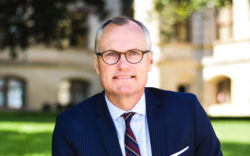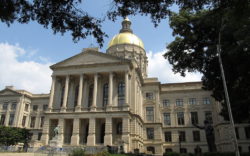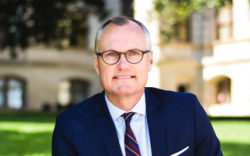John Malone is a very wealthy man. His net worth is estimated at $6.9 billion, and he is one of this country’s largest private landowners.
Arthur Blank is also a very wealthy man. His net worth is estimated at $3.1 billion, largely from money he made as one of the founders of Home Depot.
Tony Ressler isn’t quite as wealthy as Malone and Blank, but he’s close. His net worth is estimated at $1.4 billion.
These three billionaires have two things in common. For one, they own major-league sports franchises. (Malone’s company owns the Atlanta Braves, Blank the Atlanta Falcons and Ressler the Atlanta Hawks.) For another, they are being showered with tax money from state and local governments—a combined total of nearly $1 billion.
Cobb County put up $400 million to build a new stadium for the Braves.
The City of Atlanta is using hotel-motel tax revenues to put up $200 million to build a new stadium for the Falcons and $250 million to pay for the operation and maintenance of Blank’s stadium over the years. The state kicked in $40 million to build a new parking deck for Blank.
Ressler is not being ignored. Atlanta Mayor Kasim Reed announced last week that the city will spend $142.5 million to renovate Philips Arena, a basketball venue that was built just 17 years ago for the Hawks.
A rational person would ask why so much tax money is being showered upon billionaires when the state’s middle-income and low-income families have so many unmet needs. There are 127 public schools on the state’s failing schools list. Rural hospitals are shutting down for lack of operating funds. Georgia has one of the highest percentages of people without health insurance in the nation.
Atlanta, in particular, has the largest number of schools on that failing school list, and there are streets in the city that are so pockmarked with potholes you would think you’re driving on a highway through war-torn Somalia. Why isn’t Reed spending Atlanta’s tax funds on these very fundamental needs instead of diverting the money to build sports palaces for billionaires?
Reed has the misguided idea that these sports venues will be the key to all sorts of economic development. He called the Philips project “another stake in the ground” that will “transform” downtown Atlanta and supposedly bring in $1.5 billion in new development. History tells us that he is wrong. Economists have done study after study of the economic impact of new stadiums and have found that they almost never live up to what their boosters promise.
“Most evidence suggests that sports subsidies cannot be justified on the grounds of local economic development, income growth, or job creation,” said Alex Gold and Ted Gayer of the Brookings Institution. “In fact, after 20 years of academic research on the topic, peer-reviewed economics journals contain almost no evidence that sports stadiums or franchises measurably improve local economies.”
If you want proof of this, look no farther north than Gwinnett County, where the county commissioners agreed a decade ago to build a minor league baseball stadium for the Atlanta Braves organization. They said the stadium would draw large crowds and be the spark for new commercial development in the adjoining areas. It never happened.
Tim Lee, the county commissioner who engineered the Cobb County deal with the Braves, was thrown out of office by irate voters. Reed won’t have to worry about that because he can’t run for another term.
But it really doesn’t matter. When Lee and Reed have departed from the political scene, there will still be politicians who will insist that we give millions of tax dollars to billionaires who already have plenty of money so that they can build stadiums that aren’t needed. It’s the American way.
Like what you just read? Support Flagpole by making a donation today. Every dollar you give helps fund our ongoing mission to provide Athens with quality, independent journalism.









